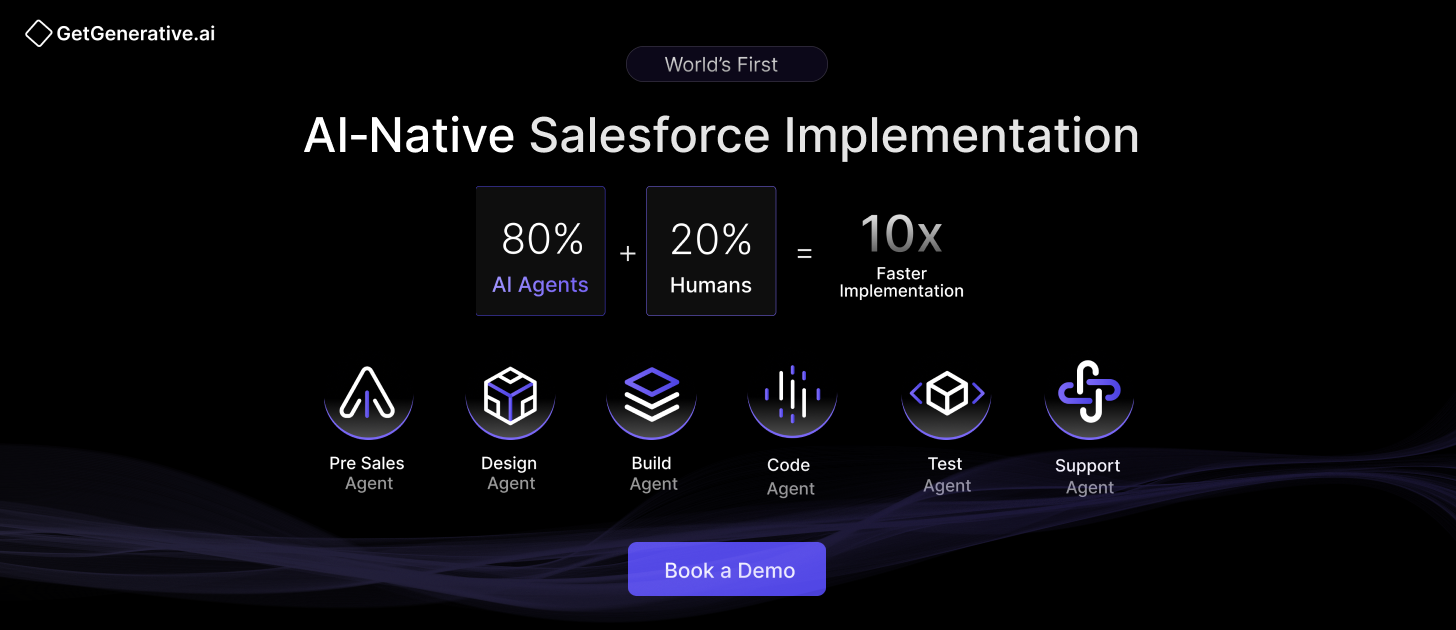Salesforce Service Cloud Implementation Proposal Template 2025
According to a Salesforce report, 88% of high-performing service decision-makers invest in digital transformation to better meet customer needs.
Salesforce Service Cloud‘s comprehensive features and integrations can transform your customer service operations. This blog will delve into the details of a Service Cloud implementation proposal, highlighting its key aspects, automation, customization, and integration capabilities to meet specific business requirements and elevate customer service standards.
What is a “Service Cloud Implementation Proposal”?
A Service Cloud implementation proposal is a strategic document designed to outline how an organization can leverage Salesforce’s Service Cloud to enhance its customer service operations significantly. This detailed proposal serves as a roadmap for adopting Service Cloud, focusing on deploying its robust automation, deep customization possibilities, and extensive integration capabilities to solve specific business challenges.
Key Features of Service Cloud
Service Cloud from Salesforce offers a range of features designed to streamline and enhance customer service operations. Here are the specific capabilities that make it a powerful tool for any organization:
1. Automation
- Case Management: Automates case routing based on agent availability and expertise, ensuring that customer issues are addressed by the most qualified person.
- Workflow Rules: Automates repetitive tasks such as sending follow-up emails and updating case statuses, which helps reduce human error and improve response times.
2. Customization
- User Interfaces: Allows for creating tailored dashboards and user interfaces that give agents the information they need in a format that enhances their workflow.
- Custom Applications: Developers can build bespoke applications within the platform to meet unique business needs, extending functionality beyond traditional customer service tools.
3. Integration Capabilities
- Salesforce Ecosystem: Seamlessly integrates with other Salesforce products like Sales Cloud and Marketing Cloud, providing a unified view of the customer across all touchpoints.
- Third-party Systems: Offers robust APIs and pre-built connectors for integrating with external systems such as ERP, accounting software, and other data sources, ensuring that all relevant information is accessible within the Service Cloud.
These features create a highly adaptable and efficient environment for managing customer interactions. By leveraging automation, customization, and integration, Service Cloud can transform how businesses interact with their customers, making every interaction more effective and impactful.
Also Read – Salesforce RFP Template: A Comprehensive Guide
What Should Be Included in a Service Cloud Implementation Proposal?
A comprehensive Service Cloud implementation proposal should be meticulously detailed, ensuring all aspects of the project are well-defined. Here’s what should be included:
Project Overview
- Goals and Objectives: Clearly state what the business aims to achieve with the Service Cloud implementation, such as enhanced customer satisfaction, reduced support times, or improved agent productivity.
- Background Information: Provide context about the company’s current customer service capabilities and the motivation behind moving to Service Cloud.
Scope of Work
- Service Cloud Features to Implement: Detail which features of Service Cloud will be used, such as case management, live agent support, or AI-powered insights, and how they will be deployed.
- Customizations Required: Describe any specific customizations that need to be made to the Service Cloud to fit the company’s needs, including custom fields, workflows, and user interfaces.
Timeline and Milestones
- Phased Rollout: Outline the project phases from planning and development to rollout and post-deployment support.
- Key Milestones: Identify major milestones such as completion of customization, training sessions for users, and go-live date.
Budget and Resource Allocation
- Detailed Budget: Break down the budget required for software, custom development, integration, training, and ongoing support.
- Resource Planning: Specify the internal and external resources needed, including the involvement of Salesforce consultants or partners.
Risk Management
- Identified Risks: List potential risks associated with the implementation, such as technical challenges or user adoption hurdles.
- Mitigation Strategies: Provide strategies to mitigate identified risks, ensuring the project remains on track.
Change Management Plan
- Training Programs: Outline the training and support provided to users to ensure the smooth adoption of the new system.
- Communication Strategy: Detail how changes will be communicated within the organization to ensure all stakeholders are informed and supportive.
Evaluation and Success Metrics
- Performance Metrics: Define how the success of the implementation will be measured, such as through customer satisfaction scores, response times, or agent productivity rates.
- Ongoing Evaluation: Plan for regular reviews and adjustments post-implementation to ensure continuous improvement.
By addressing these elements, the proposal will provide a clear, actionable plan for how Service Cloud can be implemented effectively to meet the organization’s unique needs, ensuring that stakeholders have a thorough understanding of the project scope, timeline, and expected outcomes.
How Does Service Cloud Integration Enhance Customer Service Efficiency?
Integrating Service Cloud into customer service operations enhances efficiency through several sophisticated mechanisms. Here’s how:
Centralized Communication
- Unified Platform: Service Cloud consolidates all customer interactions into one platform, from email and phone calls to social media messages. This ensures service agents have a holistic view of each customer’s interaction history, enabling more informed and personalized service.
- Instant Access to Information: Agents have quick access to customer data, past interactions, and internal knowledge bases, which reduces the time spent searching for information and allows for faster inquiry resolution.
Automated Service Processes
- Case Routing and Escalation: This system automates the distribution of cases based on agent expertise and current workload, ensuring that cases are handled by the most suitable agent and escalated appropriately without manual intervention.
- Workflow Automation: Service tasks such as sending acknowledgment emails, scheduling follow-ups, and updating status are automated, which not only speeds up the process but also minimizes human errors.
Improved Response Times
- Quick Resolution: With automated processes and easy access to comprehensive customer information, agents can resolve issues more quickly, significantly enhancing customer satisfaction.
- Proactive Service: Integration with analytical tools allows Service Cloud to provide insights and alerts about potential issues before they become critical, enabling proactive service interventions.
Enhanced Data Analysis
- Real-time Reporting: Service Cloud offers real-time analytics and reporting capabilities that allow managers to monitor service metrics like average handle time, customer satisfaction, and agent performance, leading to data-driven decisions.
- Customer Insights: Integrated data from various touchpoints provides a deeper understanding of customer needs and behaviors, enabling businesses to tailor their services for better customer engagement.
By leveraging these capabilities, Service Cloud integration streamlines workflows and significantly improves the quality of customer interactions, making it an invaluable tool for any organization focused on enhancing customer service efficiency.
Key Benefits of Implementing Service Cloud Over Other CRM Systems
- Scalability: Adapts to the growth of your business, handling increased customer interactions without compromising service quality.
- 360-Degree Customer View: Offers a comprehensive view of each customer, allowing for more personalized and informed service.
- Industry-specific Solutions: Provides solutions tailored to various industries, ensuring the system aligns with specific business requirements.
Also Read – How To Prepare a Request for Proposal (RFP): A Step-by-Step Guide
Is Service Cloud Suitable for Small to Medium-Sized Enterprises (SMEs)?
Service Cloud is suitable for SMEs due to its scalability and flexibility. Small businesses can enjoy enterprise-level customer service capabilities without needing extensive IT infrastructure. Moreover, its pay-as-you-go model ensures that SMEs can start small and expand as needed.
Future Trends in Service Cloud Implementation: What to Expect in 2025
1. AI-Powered Service Automation
With advancements in AI, Service Cloud is integrating deeper predictive capabilities to enhance service delivery. Features like Einstein AI now not only assist with case routing but also anticipate customer needs, enabling businesses to offer proactive solutions before issues arise.
2. Omni-Channel Experience Evolution
The definition of omni-channel is expanding to include emerging platforms like WhatsApp, video chats, and even metaverse touchpoints. Service Cloud is increasingly enabling businesses to manage interactions across these platforms while maintaining a unified customer view.
3. Integration with IoT for Proactive Service
Internet of Things (IoT) integration with Service Cloud allows businesses to monitor connected devices in real-time. Predictive maintenance, powered by IoT data, is becoming a standard feature, allowing organizations to resolve issues before customers are even aware of them.
4. Low-Code Customization for Faster Deployment
To accelerate implementation timelines, Salesforce is focusing on empowering businesses with low-code and no-code tools. This makes it easier for companies to customize Service Cloud according to their needs without relying heavily on development teams.
5. Focus on Sustainability
Sustainability has become a key priority for many organizations. Service Cloud now offers features that track and report on service-related carbon footprints, helping businesses align their operations with sustainability goals and improve corporate social responsibility (CSR) reporting.
6. Hyper-Personalized Service with Data Clouds
The integration of Salesforce Data Cloud enhances Service Cloud’s capability to deliver hyper-personalized service experiences. By unifying customer data from multiple sources, businesses can better understand and anticipate customer needs, leading to more tailored support.
Conclusion
Implementing Service Cloud can significantly enhance the efficiency and effectiveness of customer service operations. A well-crafted Service Cloud implementation proposal is crucial for outlining the potential impacts and planning the integration process to maximize ROI.
At GetGenerative.ai, we’ve reimagined Salesforce implementation—built from the ground up with AI at the core. This isn’t legacy delivery with AI added on. It’s a faster, smarter, AI-native approach powered by our proprietary platform.
👉 Explore our Salesforce AI consulting services
Frequently Asked Questions (FAQs)
1. How long does a typical Service Cloud implementation take?
It varies based on complexity, ranging from a few weeks to several months.
2. Can Service Cloud be integrated with third-party applications?
It offers extensive APIs and pre-built integrations for seamless connectivity with external systems.
3. What is the average cost of implementing Service Cloud?
Costs can vary based on the scope of implementation and required customizations. It’s advisable to consult with a Salesforce partner for a detailed quote.
4. Is training provided during the implementation?
Yes, Salesforce and certified partners offer comprehensive training programs to ensure successful adoption.




